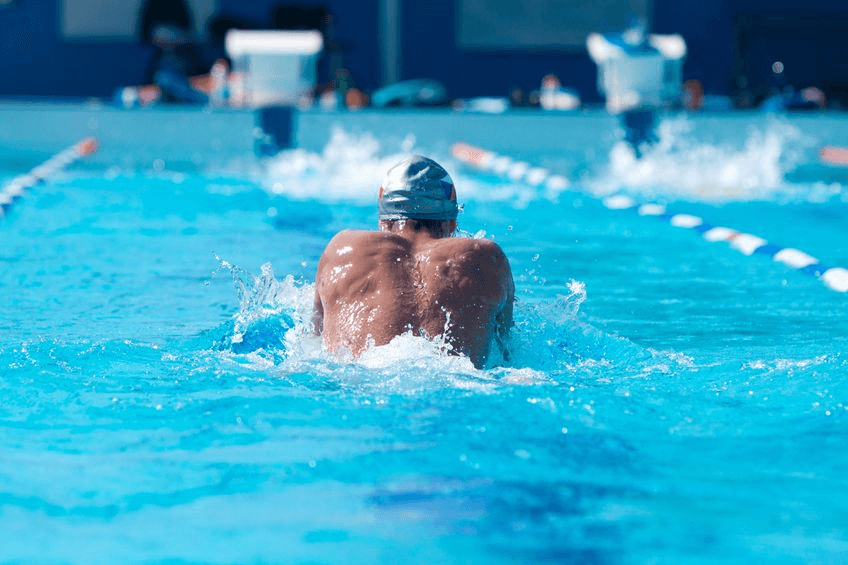For some swimmers getting up well before the crack of dawn to go jump in a cold pool ranks right up with distance fly sets.
And by “some” swimmers what I meant to say was “all” swimmers.
That being said, getting up early in the AM doesn’t have to be a battle.
There are heaps of perks to being one of the first people up and at it. It builds discipline, is a proving ground for commitment and dedication, and to be honest, there is something kind of cool about getting into a completely still pool while the rest of the world is still asleep.
Anyways.
Back to the whole “struggle” part.
Here are 7 little strategies that I wish I had known for making getting up early in the morning a whole lot easier:
1. Make everything about getting up in the morning awesome.
Sure, the actual act of waking up might not be the most pleasant thing, but if you line up a bunch cool things that you really, really like for the AM than it will make sliding out of the sheets a little easier.
Use your favorite new song as the tone for your alarm clock. Eat your favorite (healthy) foods for the first meal of the day. Download your favorite show the night before and watch it when you are eating breakfast.
Make the morning chock-full of the things you like and they will collectively go a long way to making getting up in the morning something you look forward to instead of ruing.
2. Make everything about getting up in the morning easy.
Something I figured out as a little age grouper—and admittedly didn’t practice regularly enough—was prepping my stuff the night before made the following mornings much easier.
When I had my swim bag and lunch prepped for the next day the sense of preparation helped me sleep a little easier, gave me some valuable extra minutes of sleep the following morning, and removed some of the friction that comes from having absolutely zero willpower at that point of the day.
Pack your swim bag, have your lunch ready (if you are headed straight to school after practice), and lay out the clothes you are going to wear. You’ll thank yourself for that extra ten minutes you get to lay in bed tomorrow morning.
Remember: the less obstacles there are to getting up for swim practice, the easier it will be to get up.
3. Wake up and get up fast. Real fast.
This may not work for everyone — it is something that I realized about myself after much trial and error (the key word being error).
Once that alarm clock goes off, before you can even think about rolling over, shoot out of bed. Rip open the blinds and turn on all of the lights and deny your noodle the opportunity to talk you out of getting up.
The snooze button never worked well for me, and neither did laying in bed for 20 minutes to “wake up.” If you find yourself on the losing battle of the should-I or shouldn’t-I debate when laying in bed, eliminate the conversation altogether by vaulting out of bed.
SEE ALSO: 15 Sleep Strategies for High Performance Athletes
4. Manage your electronics.
It took me until adulthood to understand that I couldn’t sleep in the same room as my cell phone. In my half-awake state I’d roll over and catch a glimpse of the red blinking light and be unable to quench my desire to see who had messaged me in the middle of the night.
If you are more comfy with the cell in the bedroom than I am, and you are using it as an alarm clock, park it on the other side of the room so that you absolutely have to get up to turn off the horrifyingly loud alarm at 5 in the morning.
5. Wake up at the same time, but go to sleep when you are tired.
Your body doesn’t need the exact same amount of sleep each night. There’ll be days when you have two massive workouts and a full day of school and homework and you can barely keep your eyes open past 8pm. You’ll need 8-9+ hours to recover. On other days your schedule will be a little more leisurely, and the snooziness won’t hit you until 10 or 11pm, and you will only need 6-7 hours of sleep.
Instead of beating your head and telling yourself that you have to be in bed at an exact time or else (which tends to instigate the sleep-depriving and agonizing “How much sleep will I get tonight if I fall asleep right now?” game) simply get up at the same time each day.
Within a few days you will find that you body will let you know when it is time to go to bed instead of you trying to force it to go to bed when it might not be primed to do so.
6. Have a routine for powering down.
If getting up at the same time each day isn’t in the cards for you, and you need to be a little more discretionary about when you go to sleep, put together a power-down routine.
Put together a simple list of 4-5 things that you always do before bed, so much like Pavlov’s puppies you condition your body to go to sleep after given a specific set of cues or triggers. The cues might include things like: brushing your teeth, reading for 15 minutes, tidying up your room, packing your lunch for the following day, arranging your gear for the morning, and so on.
Make the list and follow through with it consistently and soon enough you will be able to tell your body when it is nighty-night time.
7. Make a 2 minute commitment.
The big things in life are achieved with tiny, little steps. Sometimes one of those big things in life is getting out of that warm, cozy bed when snow is blowing sideways outside.
When you start to feel that tug and whisper of your pillows and blankets telling you that it will be okay if you miss just this one practice, that no one will notice or care, tell that voice that you are going to get up for just a couple minutes. Get up, walk around, eat some food.
After a couple minutes 99% of the time the voice of resistance will fade into the back of your brain.
More Stuff Like This:
How Much Sleep Should Swimmers Be Getting? Swimmers train– a lot. As a result, their sleep requirements are above and beyond what most day-walkers need. Here is some research on how much swimmers are actually sleeping, and a guideline for how much you should get if you want out-sized results in the water.
How Swimmers Can Get More Sleep. Here is a list of things competitive swimmers can do in order to get more recovery in by getting more sleep.














